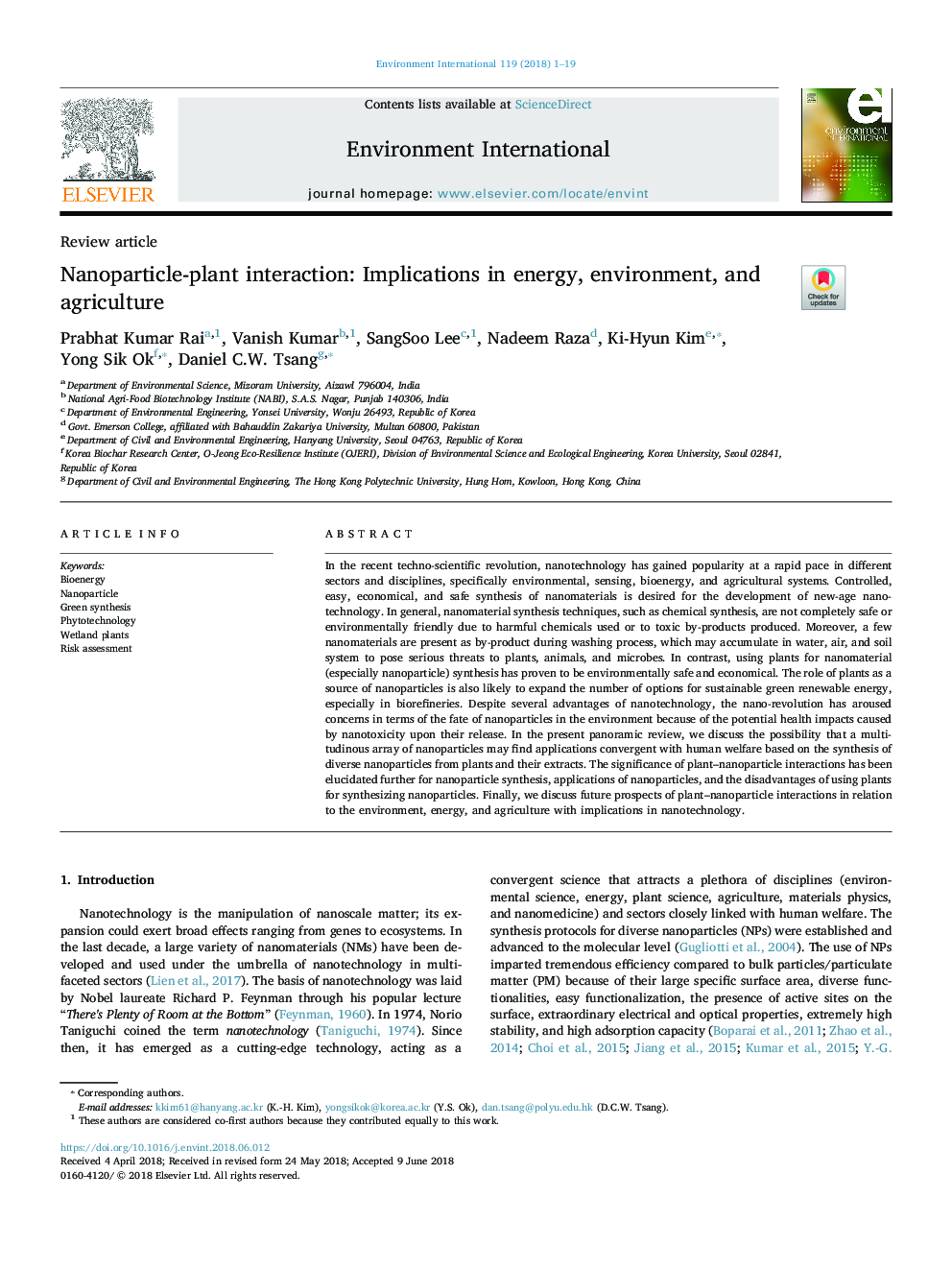| کد مقاله | کد نشریه | سال انتشار | مقاله انگلیسی | نسخه تمام متن |
|---|---|---|---|---|
| 8854943 | 1619011 | 2018 | 19 صفحه PDF | دانلود رایگان |
عنوان انگلیسی مقاله ISI
Nanoparticle-plant interaction: Implications in energy, environment, and agriculture
ترجمه فارسی عنوان
تعامل نانوذرات: تأثیرات در انرژی، محیط زیست و کشاورزی
دانلود مقاله + سفارش ترجمه
دانلود مقاله ISI انگلیسی
رایگان برای ایرانیان
کلمات کلیدی
بیو انرژی، نانوذرات، سنتز سبز، فیتو فناوری، گیاهان تالاب، ارزیابی ریسک،
ترجمه چکیده
در انقلاب تکنولوژیکی اخیر، فناوری نانو در سرعت های گوناگونی در بخش ها و رشته های مختلف، به ویژه محیط زیست، سنجش از دور، انرژی زیستی و سیستم های کشاورزی به دست آورد. کنترل نانومواد، کنترل، آسان، مقرون به صرفه و ایمن برای توسعه فناوری نانو جدید سالم است. به طور کلی، تکنیک های سنتز نانومواد، مانند سنتز شیمیایی، به علت مواد شیمیایی مضر استفاده شده و یا سموم سمی تولید شده به طور کامل بی خطر و محیط زیست نیستند. علاوه بر این، چندین نانومواد در فرآیند شستشو به عنوان محصول جانبی حضور دارند که ممکن است در سیستم آب، هوا و خاک تجمع یابد تا تهدید جدی برای گیاهان، حیوانات و میکروبها باشد. در مقابل، استفاده از گیاهان برای نانومواد (به ویژه نانوذرات) سنتز ثابت شده است که از لحاظ زیست محیطی و اقتصادی است. نقش گیاهان به عنوان منبع نانوذرات نیز احتمالا تعداد گزینه هایی برای انرژی های تجدید پذیر انرژی پایدار را به خصوص در کارخانجات زباله سازی گسترش می دهد. علیرغم چندین مزیت فناوری نانو، نانو انقلاب موجب نگرانی در مورد سرنوشت نانو ذرات در محیط زیست شده است که به دلیل تاثیرات بالقوه سلامتی ناشی از نانوکسیسیتی پس از انتشار آنها است. در بررسی پانورامیک کنونی، ما در مورد این احتمال که یک آرایه ناقص از نانوذرات ممکن است برنامه های کاربردی همسان با رفاه انسان بر اساس سنتز نانوذرات متنوع از گیاهان و عصاره های آنها را بررسی کنید. اهمیت همکاری های نانوذرات گیاهی برای ساخت سنتز نانوذرات، کاربرد نانوذرات و معایب استفاده از گیاهان برای سنتز نانوذرات روشن شده است. در نهایت، ما در مورد آینده چشم انداز تعاملات نانوذرات گیاهی در ارتباط با محیط زیست، انرژی و کشاورزی با مفاهیم در فناوری نانو بحث می کنیم.
موضوعات مرتبط
علوم زیستی و بیوفناوری
علوم محیط زیست
شیمی زیست محیطی
چکیده انگلیسی
In the recent techno-scientific revolution, nanotechnology has gained popularity at a rapid pace in different sectors and disciplines, specifically environmental, sensing, bioenergy, and agricultural systems. Controlled, easy, economical, and safe synthesis of nanomaterials is desired for the development of new-age nanotechnology. In general, nanomaterial synthesis techniques, such as chemical synthesis, are not completely safe or environmentally friendly due to harmful chemicals used or to toxic by-products produced. Moreover, a few nanomaterials are present as by-product during washing process, which may accumulate in water, air, and soil system to pose serious threats to plants, animals, and microbes. In contrast, using plants for nanomaterial (especially nanoparticle) synthesis has proven to be environmentally safe and economical. The role of plants as a source of nanoparticles is also likely to expand the number of options for sustainable green renewable energy, especially in biorefineries. Despite several advantages of nanotechnology, the nano-revolution has aroused concerns in terms of the fate of nanoparticles in the environment because of the potential health impacts caused by nanotoxicity upon their release. In the present panoramic review, we discuss the possibility that a multitudinous array of nanoparticles may find applications convergent with human welfare based on the synthesis of diverse nanoparticles from plants and their extracts. The significance of plant-nanoparticle interactions has been elucidated further for nanoparticle synthesis, applications of nanoparticles, and the disadvantages of using plants for synthesizing nanoparticles. Finally, we discuss future prospects of plant-nanoparticle interactions in relation to the environment, energy, and agriculture with implications in nanotechnology.
ناشر
Database: Elsevier - ScienceDirect (ساینس دایرکت)
Journal: Environment International - Volume 119, October 2018, Pages 1-19
Journal: Environment International - Volume 119, October 2018, Pages 1-19
نویسندگان
Prabhat Kumar Rai, Vanish Kumar, SangSoo Lee, Nadeem Raza, Ki-Hyun Kim, Yong Sik Ok, Daniel C.W. Tsang,
